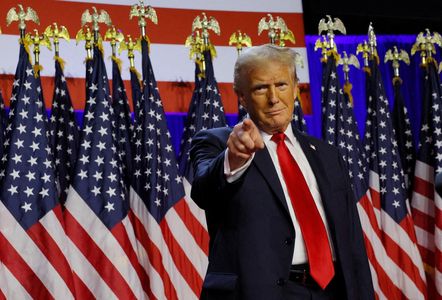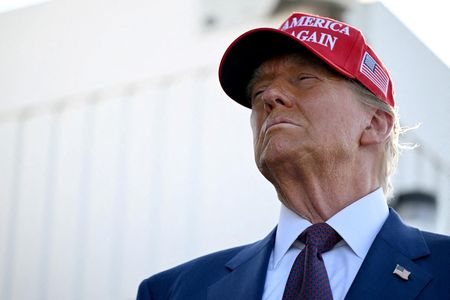This week, President-elect Donald Trump announced that he was going to impose massive tariffs against the U.S.'s big trading partners like Canada and Mexico. But how will tariffs impact foreign policy? The panel discusses the issue and also breaks down what lies ahead for the future of health care in America.
Clip: How foreign policy, domestic health care may change under a second Trump term
Nov. 29, 2024 AT 8:27 p.m. EST
TRANSCRIPT
Notice: Transcripts are machine and human generated and lightly edited for accuracy. They may contain errors.
Jeffrey Goldberg: Dan, I mean, so many of these senior nominations have expressed strong criticism for the departments that they're going to lead, or if they're confirmed going to lead, expressed loathing even for the departments and the, quote/unquote, deep state operatives who are -- that's another term, a derogatory term for civil service, senior government employees. How does this -- I mean, you've been watching, Washington. How does it work when all these people come into departments that they claim to hate? Can the people who are working there actually thwart, to use the word of the day, thwart what these nominees, what these future cabinet secretaries want to do?
Dan Balz: Up to a point, sure, because the machinery of government works slowly, right? It's very hard to simply dictate change. There are ways that people in the civil service can resist or slow walk things. There are ways in which lawsuits can be brought. There are ways in which Congress can raise questions. This Congress probably won't raise many of those questions, but that could be done if things get out of hand.
But, you know, I think one thing that's so different this time than the first time he came into government, I mean, they're very well-organized about what they're up to. I mean, he has populated this cabinet in record time.
Jeffrey Goldberg: There was even a project, if I recall, that talked about this.
Dan Balz: What year was that?
Jeffrey Goldberg: I don't remember, but I can look it up.
Dan Balz: But the way they have started out suggests that they have a much clearer notion of what they want to do, and some of the ways they want to do it.
Now, will they be successful on all of this? No.
Elizabeth Bumiller: But, you know, we're also on to him this time around. So, this week, he announced that he was going to impose these massive tariffs against our big trading partners, Canada and Mexico, against a trade agreement that he himself negotiated in his first term. And he was going to impose 25 percent tariffs on China.
And the next day, you would think the stock market would have tanked because it was going to raise prices, it was going to cause inflation, it was going to do all these terrible things. The stock market went up. And the betting was that this was just a negotiating tactic. We've seen this before from Trump. He threatened all these things last time around, and a lot of it didn't happen.
Jeffrey Goldberg: So, his followers might believe that he actually imposed these tariffs, but he's not actually going to impose them?
Elizabeth Bumiller: Well, we shall see. But, again, the reasons he said he was doing it didn't make a great deal of sense.
Jeffrey Goldberg: So, Jon, what does the composition of this team mean in foreign policy? I mean, this is one where I'm trying to -- foreign policy and national security -- where I'm trying to get my hands around the idea that Marco Rubio, classic Republican muscular interventionist, is going to be in the same national security group as Tulsi Gabbard, who is an apologist for Bashar al-Assad and Vladimir Putin. How does it work? I mean, how do, how can you sort of guess even what our foreign policy is going to look like, vis-a-vis Ukraine, as one example?
Jonathan Karl: I mean, actually, the emerging foreign policy team, put aside Tulsi Gabbard and maybe put aside Donald Trump, but his emerging team looks pretty mainstream Republican, Michael Waltz, as the national security adviser, John Ratcliffe as the CIA director, Marco Rubio as the secretary of state, and we'll see what happens if Pete Hegseth is confirmed at defense. That would be --
Jeffrey Goldberg: It looks -- that's a wild card.
Jonathan Karl: I mean, that's certainly a wild card in many ways.
So, look it's interesting that Ratcliffe was the former director of National Intelligence.
Jeffrey Goldberg: Right, who's now nominee to run the CIA.
Jonathan Karl: And now the nominee to run the CIA. And he wanted -- as I understand it, he wanted CIA, saw it as a more powerful --
Jeffrey Goldberg: It's the real ballast of the intelligence community.
Elizabeth Bumiller: That's the much more powerful job, the DNI.
Jeffrey Goldberg: It's a more powerful job, even though technically --
Jonathan Karl: So, Tulsi Gabbard is technically in the top, but it's a coordination role. How much influence on policy is she really going to have? Who knows?
But the real question is Trump's own views on this and Trump, I mean, I think was pretty clearly much closer to Tucker Carlson and Tulsi Gabbard than Marco Rubio or Mike Waltz or the kind of the mainstream Republicans on this or what used to be the mainstream Republicans.
Jeffrey Goldberg: Right. One -- I mean, there's so many subjects to visit and refract them through this cabinet, but health policy is an area of immense interest right now, because he did the most improbable thing, which is make RFK Jr. in charge of HHS, right? What do you think that's going to look like? That's a case, Dan, in which he's really putting the direct critics of the agencies in charge of those agencies, NIH, FDA, CDC, et cetera?
Dan Balz: I don't think there's any area of government in which that is more clear than the health area. I mean, everything he has done has pointed to upheaval in healthcare policy and a challenge to traditional healthcare policy that has been carried out for and years and years across many administrations. Exactly what the upshot of that would be, I don't we know other than they want to set off a debate, clearly sort of focused around what happened during COVID, a debate about what should or shouldn't have been done and what the government should be doing in the future. That's going to be a huge --
Elizabeth Bumiller: So many of these health picks are a reaction to the pandemic, you know, the anti-vaccine, the vaccine skepticism of RFK Jr. But this week, Dr. Bhattacharya, who was selected to be the head of NIH, which I would like to hear what Dr. Fauci has to say about that --
Dan Balz: Or Francis Collins.
Elizabeth Bumiller: Or Francis Collins. But just, the fact that he's not a scientist, for one thing, and scientists usually lead NIH, and so there's a deep concern at the NIH. But also he, during the pandemic, thought that there should be no vaccines for children, young people, and they should just get sick and have herd immunity.
Jeffrey Goldberg: We're going to have to revisit that the health questions, and that they're among the most interesting along with defense and really everything else. We're going to have to do that another week because we've run out of time, unfortunately. But I want to thank Dan, Elizabeth and Jon for joining me at the table.
!FROM THIS EPISODE


Clip: What to expect from Trump's planned federal overhaul


Full Episode: Washington Week with The Atlantic full episode, 11/29/24

© 1996 - 2026 WETA. All Rights Reserved.
PBS is a 501(c)(3) not-for-profit organization
